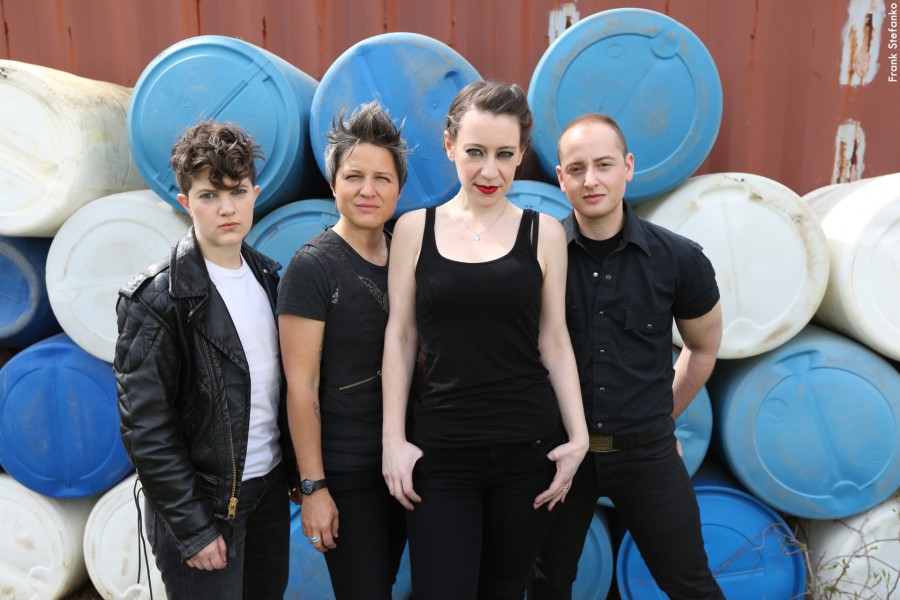Home of the forward-thinking Theater J, Washington Jewish Film Festival, and Jewish Literary Festival, the Washington D.C. Jewish Community Center usually has no problem hosting edgy artistic programming. But it draws the line at artists who support sanctioning Israel.
Accordingly, Brooklyn rock band The Shondes has been abruptly yanked off the center’s annual Washington Jewish Music Festival because of the band’s stance against Israel’s occupation of Palestinian territories.
The Shondes’ singer and bassist, Louisa Solomon, says D.C. JCC CEO Carole Zawatsky called her last week and informed her that her band was no longer welcome on the festival, which takes place in June. “Carole informed me, repeatedly, that the JCC had to ‘disassociate from The Shondes’ because of their line on Israel,” Solomon writes in an email. “I asked her to elaborate on that line, and she said that they cannot allow people who support the Boycott, Divestment, Sanctions movement to use an event of theirs as a ‘platform.'”
In fact, the D.C. Jewish Community Center does have a policy against the BDS movement, an international campaign whose mission is to pressure Israel into restoring Palestinian rights and ceasing its occupation of Arab lands. That policy is no secret. It’s clearly posted on the center’s website:
The Washington DCJCC stands firmly in support of Israel as an independent Jewish state. We support open, balanced and respectful dialogue that engages a broad community in meaningful conversation. We choose our partners and affiliations to ensure that all programming supports the DCJCC’s mission to preserve and strengthen Jewish identity, heritage, tradition and values. We oppose “Boycotts, Divestment and Sanctions” of Israel (BDS) and all efforts to delegitimize the right of the State of Israel to exist.
“I asked whether a signed agreement stating that we would not use their event as a ‘platform’ for discussing BDS would suffice—I really wanted to understand their position,” Solomon writes. “[Zawatsky] said that it would not suffice, which made it clear to me that the issue isn’t limited to controlling open discussion of Israel at JCC events, it’s actually about blacklisting those of us who don’t share their views.” Solomon says that she tried to discuss the issue further, but Zawatsky “shut the conversation down at that point, restating their need to ‘disassociate’ from us.”
This isn’t a new thing for the D.C. JCC. A similar scenario played out earlier this year involving author David Harris-Gershon, whose appearance the JCC canceled for the same reason. But the center has also come under fire from the other side, most recently for planning to present a play, “The Admission,” that one local group considered grossly anti-Israel. (The center went on to stage the play in a scaled-back form; it’s playing now at Theater J to largely positive reviews.)
Asked to comment on the cancelation, Zawatsky writes in an email, “This band, which embraces boycotting Israel, exceeds the redline limits of the DCJCC’s open policy.”
Solomon, meanwhile, doesn’t consider her views at all extreme. “Boycott is an historic and constitutionally protected tactic,” she writes. “I support the BDS movement because we desperately need to exert pressure on Israel and draw attention to their mistreatment of Palestinians. The occupation is illegal, brutal, and unjust, and it is hard to imagine anyone with both a heart and a mind concluding anything else.”
The Shondes’ show was originally booked at Black Cat June 2 in cooperation with the Jewish Music Festival. Now it will take place as scheduled with a different supporter: the organization Jewish Voice for Peace. Fans won’t be disappointed. But Solomon still has strong words for the cultural center that canceled her band’s show.
“If an institution claiming to serve ‘the Jewish community’ casts me out for taking an ethical stance against injustice, they should consider what kind of Judaism they represent.”



Pingback: JCC Pulls the Shondes From Festival Line-Up Over Stance on Israel - Arts Desk()
Pingback: DC JCC Cancels THE SHONDES for Speaking out on Israel — The Shondes()
Pingback: Theater J Cancels Middle East Festival, Prompting Censorship Debate |()
Pingback: Theater J Cancels Middle East Festival, Prompting Censorship Debate | Pally News()